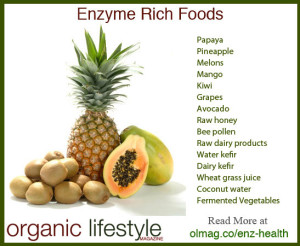Enzymes and Health
Enzymes and Digestion, Enzymes and Health, and a List of Enzyme-rich foods
The human body produces two categories of enzymes- metabolic and digestive. Metabolic enzymes are intra-cellular (in the cell), and are used for reproduction and replenishment of the cells as well as to maintain and rebuild the organs, tissues, and blood. Digestive enzymes are used to break down food for the proper assimilation of nutrients.
The Role of Digestive Enzymes
The importance of digestive enzymes resides in the fact that the human body cannot absorb nutrients found in food unless you have an adequate supply of enzymes available in order to break them down. In the book, Micro Miracles, Ellen W. Cutler writes about the important role that enzymes play in the digestive process. “Digestive enzymes assist with the digestion of food, the absorption of nutrients, and the delivery of those nutrients throughout the body. The most commonly known digestive enzymes are secreted from the pancreas into the small intestine, where each is responsible for breaking down a specific compound.”
Digestive enzymes are classified based on their target substrates, the three main are:
- Protease- which split proteins into small peptides and amino acids.
- Lipase- which split fats into three fatty acids and a glycerol molecule.
- Amylase – for the digestion of carbohydrates.
As food is digested, it gets broken down for absorption, and then transported by the blood through the power of enzymatic activity, with nutrients and enzymes working synergistically with each other, functioning as catalysts in countless biological reactions within the body.
Enzymes From the Food We Eat
 The final category of enzymes comes from the foods we eat. When foods contain sufficient amounts of their own enzymes, digestion can begin at the very first bite. The act of chewing your food thoroughly and mixing it with saliva will activate some of the enzymes naturally found in food. However, research indicates that when food is cooked above 118 degrees, the heat will kill most of the enzymes resulting in diminished nutritional values. This deficit in enzymes is one of the major problems facing our modern-day society, which dines almost exclusively on cooked, fast, or processed foods.
The final category of enzymes comes from the foods we eat. When foods contain sufficient amounts of their own enzymes, digestion can begin at the very first bite. The act of chewing your food thoroughly and mixing it with saliva will activate some of the enzymes naturally found in food. However, research indicates that when food is cooked above 118 degrees, the heat will kill most of the enzymes resulting in diminished nutritional values. This deficit in enzymes is one of the major problems facing our modern-day society, which dines almost exclusively on cooked, fast, or processed foods.
The Work of Dr Edward Howell
Dr. Edward Howell, an early pioneer in the field, spent his entire professional life studying enzymes. He believed that people were born with limited enzyme-producing capabilities and that life expectancy depended on how well this “enzyme potential”was preserved. He believed that when we eat enzyme-depleted foods, our bodies must work harder to manufacture all of the enzymes necessary to support the digestive and assimilation processes.
Enzyme production related to digestion already consumes large amounts of energy, and the lack of enzymes from food will only curtail the availability of enzymatic activity to the rest of the body. For example, tissues such as the brain, heart, lungs, kidneys, liver, and muscles won’t get all the enzymes they need in order repair and function properly. Dr. Howell believed that this resulting metabolic enzyme deficit was the root cause of most illnesses such as heart disease, cancer, diabetes, and other chronic health problems.
Enzymes and Aging
As we age, our bodies progressively lose the ability to produce enzymes, with major drops occurring every ten years of life. At the early stages of this process, you may not notice any differences, but as it continues, you may discover that you can no longer tolerate certain foods that you may have previously enjoyed. This intolerance may also be accompanied by feelings of fatigue, allergies, and digestive discomforts including heartburn, gas, constipation, bloating, and ulcers.
By incorporating some simple dietary strategies we can begin to make deposits into our enzyme stores instead of the constant withdrawals which have become the norm for many people.
Increase enzyme activity by soaking and sprouting seeds, legumes, and nuts
Read How to Sprout Seeds and Legumes in a Jar and Soaking Nuts and Seeds to Increase Enzyme Potential.
Enzyme-rich foods to include in your diet:
- Papaya
- Pineapple
- Melons
- Mango
- Kiwi
- Grapes
- Avocado
- Raw honey (the enzymes actually come from the bee’s saliva)
- Bee pollen
- Raw dairy products
- Water kefir
- Dairy kefir
- Wheat grass juice
- Coconut water
- Eat a diet rich in raw foods
- Take a quality digestive enzyme with meals
- Fermented vegetables (check out this video: Fermenting Vegetables)
